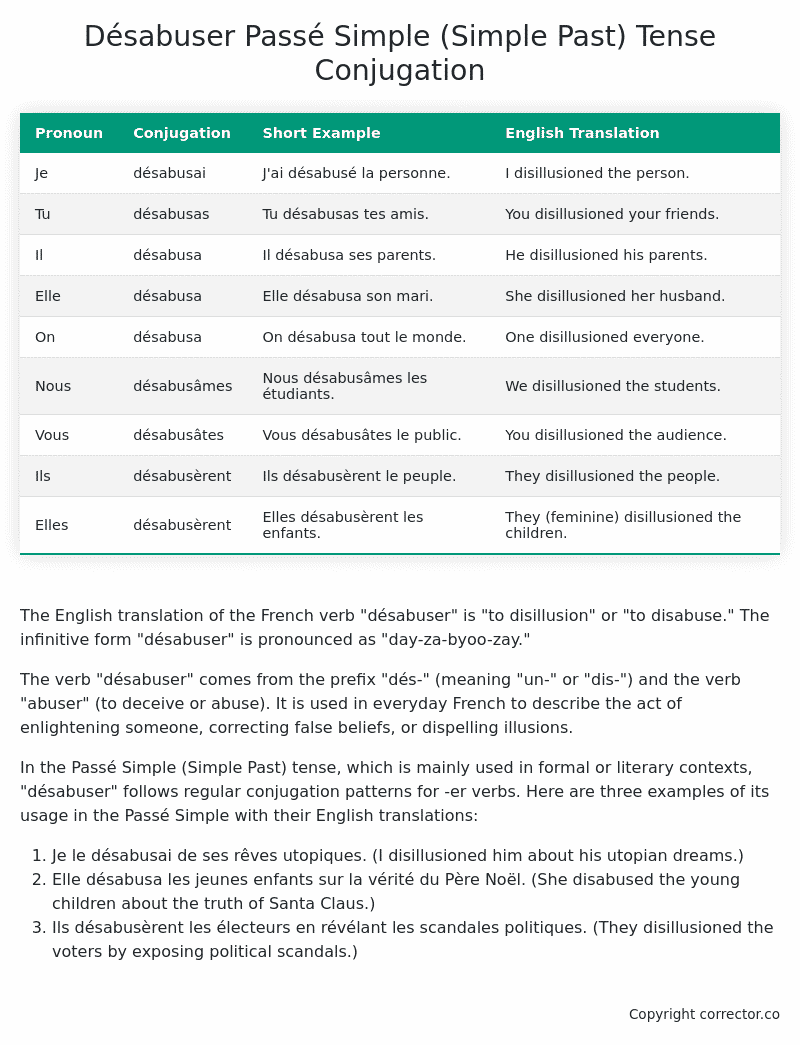Passé Simple (Simple Past) Tense Conjugation of the French Verb désabuser
Introduction to the verb désabuser
The English translation of the French verb “désabuser” is “to disillusion” or “to disabuse.” The infinitive form “désabuser” is pronounced as “day-za-byoo-zay.”
The verb “désabuser” comes from the prefix “dés-” (meaning “un-” or “dis-“) and the verb “abuser” (to deceive or abuse). It is used in everyday French to describe the act of enlightening someone, correcting false beliefs, or dispelling illusions.
In the Passé Simple (Simple Past) tense, which is mainly used in formal or literary contexts, “désabuser” follows regular conjugation patterns for -er verbs. Here are three examples of its usage in the Passé Simple with their English translations:
- Je le désabusai de ses rêves utopiques. (I disillusioned him about his utopian dreams.)
- Elle désabusa les jeunes enfants sur la vérité du Père Noël. (She disabused the young children about the truth of Santa Claus.)
- Ils désabusèrent les électeurs en révélant les scandales politiques. (They disillusioned the voters by exposing political scandals.)
Table of the Passé Simple (Simple Past) Tense Conjugation of désabuser
| Pronoun | Conjugation | Short Example | English Translation |
|---|---|---|---|
| Je | désabusai | J’ai désabusé la personne. | I disillusioned the person. |
| Tu | désabusas | Tu désabusas tes amis. | You disillusioned your friends. |
| Il | désabusa | Il désabusa ses parents. | He disillusioned his parents. |
| Elle | désabusa | Elle désabusa son mari. | She disillusioned her husband. |
| On | désabusa | On désabusa tout le monde. | One disillusioned everyone. |
| Nous | désabusâmes | Nous désabusâmes les étudiants. | We disillusioned the students. |
| Vous | désabusâtes | Vous désabusâtes le public. | You disillusioned the audience. |
| Ils | désabusèrent | Ils désabusèrent le peuple. | They disillusioned the people. |
| Elles | désabusèrent | Elles désabusèrent les enfants. | They (feminine) disillusioned the children. |
Other Conjugations for Désabuser.
Le Present (Present Tense) Conjugation of the French Verb désabuser
Imparfait (Imperfect) Tense Conjugation of the French Verb désabuser
Passé Simple (Simple Past) Tense Conjugation of the French Verb désabuser (You’re reading it right now!)
Passé Composé (Present Perfect) Tense Conjugation of the French Verb désabuser
Futur Simple (Simple Future) Tense Conjugation of the French Verb désabuser
Futur Proche (Near Future) Tense Conjugation of the French Verb désabuser
Plus-que-parfait (Pluperfect) Tense Conjugation of the French Verb désabuser
Passé Antérieur (Past Anterior) Tense Conjugation of the French Verb désabuser
Futur Antérieur (Future Anterior) Tense Conjugation of the French Verb désabuser
Subjonctif Présent (Subjunctive Present) Tense Conjugation of the French Verb désabuser
Subjonctif Passé (Subjunctive Past) Tense Conjugation of the French Verb désabuser
Subjonctif Imparfait (Subjunctive Imperfect) Tense Conjugation of the French Verb désabuser
Subjonctif Plus-que-parfait (Subjunctive Pluperfect) Tense Conjugation of the French Verb désabuser
Conditionnel Présent (Conditional Present) Tense Conjugation of the French Verb désabuser
Conditionnel Passé (Conditional Past) Tense Conjugation of the French Verb désabuser
Conditionnel Passé II (Conditional Past II) Tense Conjugation of the French Verb désabuser
L’impératif Présent (Imperative Present) Tense Conjugation of the French Verb désabuser
L’impératif Passé (Imperative Past) Tense Conjugation of the French Verb désabuser
L’infinitif Présent (Infinitive Present) Tense Conjugation of the French Verb désabuser
L’infinitif Passé (Infinitive Past) Tense Conjugation of the French Verb désabuser
Le Participe Présent (Present Participle) Tense Conjugation of the French Verb désabuser
Le Participe Passé (Past Participle) Tense Conjugation of the French Verb désabuser
Struggling with French verbs or the language in general? Why not use our free French Grammar Checker – no registration required!
Get a FREE Download Study Sheet of this Conjugation 🔥
Simply right click the image below, click “save image” and get your free reference for the désabuser Passé Simple tense conjugation!

Désabuser – About the French Passé Simple (Simple Past) Tense
Formation
Usage
Narration
Historical Context
Interactions with other tenses
Passé Composé
Imparfait
Conditional and Subjunctive
Summary
I hope you enjoyed this article on the verb désabuser. Still in a learning mood? Check out another TOTALLY random French verb conjugation!


